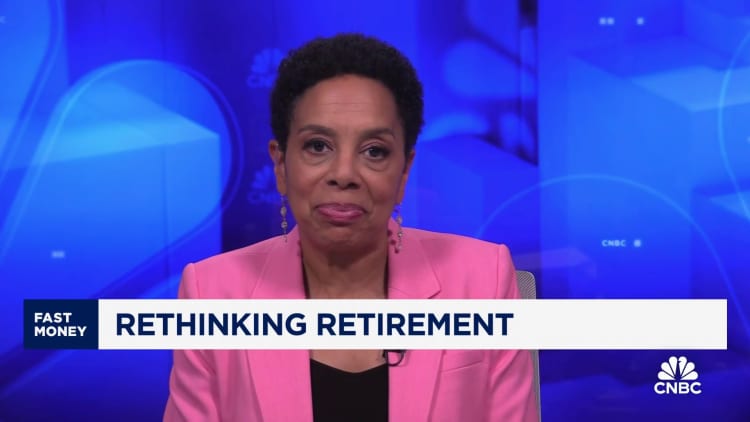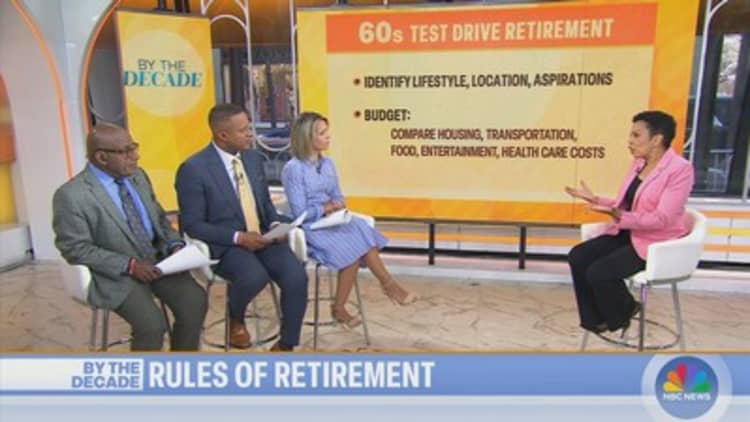Rgstudio | E+ | Getty Images
Owning a home makes some people feel more confident about their retirement prospects, but that may be wrong, some experts say.
About 37% of workers surveyed, including those with part-time or full-time jobs, or who are self-employed or business owners, say they are “early” (7%) or “on time” (30%) in their saving for retirement, according to the Your Money Retirement Survey by SurveyMonkey and CNBC.com.
Of those who said they were early or on time, 42% say an early start to retirement savings helped them get ahead. Other factors that contributed to their preparedness included little or no debt (38%) and equity or home ownership (37%), according to the report.
The survey polled 6,657 adults, including 2,603 retired adults and 4,054 working adults, in August.
More Personal Finance content:
The “vibecession” is ending as the US economy makes a soft landing
How the election could affect your taxes
Here’s How To Know If Your College Kid Really Needs “Dormitory Insurance”
But homeowners’ confidence in the richness of their home’s value may be misplaced, according to Angie Chen, senior research economist and deputy director of savings research at Boston College’s Center for Retirement Research.
“Homeowners are actually more likely to be overconfident about their retirement preparation,” Chen said. “There’s a lot of misconception about how people assess whether or not they’re ahead in retirement.”
Still, owning a home can help bring other benefits in your retirement years, said Winnie Sun, co-founder and managing director of Sun Group Wealth Partners in Irvine, California.
Here’s what you need to know.
“Confident or not concerned enough”

The Center for Retirement Research’s National Retirement Risk Index measures the share of working-age households at risk of not being financially prepared for retirement. Comparing individual household assessments to the NRRI in 2023, a CRR analysis found that 28% are “not concerned enough,” meaning they think they are not at risk, while the index predicts they are.
“People who own homes but still owe a lot on their homes are much more likely to be overconfident or not worried enough,” Chen said.
To better assess retirement readiness, “it’s important to consider not only the value of your home, but also how much you’ve borrowed,” Chen said, and how much you still owe.
For example: If you bought a $500,000 home, but still owe $400,000 on it, your equity is really $100,000, he said. Tapping into that equity isn’t always cheap, and there can be risks to borrowing against your home, experts say.
“Housing is not really liquid,” Chen said. “You can feel good about having this big asset, but you can’t consume it in retirement. You can’t spend it in a way that you can spend and consume other kinds of savings.”
On the other hand, owning a home can have certain advantages, according to experts.
“You have a controlled housing cost”
Whether you’re building home equity into retirement preparation or not, owning a home can have other financial benefits in retirement.
“Home ownership is kind of a double whammy,” said Sun, who is a member of CNBC’s Financial Advisory Board.
For one, you are building capital. When you sell the property, say if you downsize once you’re retired, you can access that money as a lump sum, Sun explained.
Also, while you own the property “you have a controlled housing cost” that can include a fixed mortgage payment, Sun said.
Although home ownership costs such as home insurance and property taxes have risen in recent years, you may qualify for higher utility prices by the time you’re retired, Sun said.

“Many of my clients, as they get older, can also qualify for senior pricing on their utilities,” Sun said. “So some of their costs could go down as they get older.”
Even though a home isn’t liquid, you can tap into your home equity if you need to, experts say.
“In most cases, for retirees, they see equity as their emergency fund,” Sun said.
#Homeowners #overconfident #retirement #readiness #economist #Heres